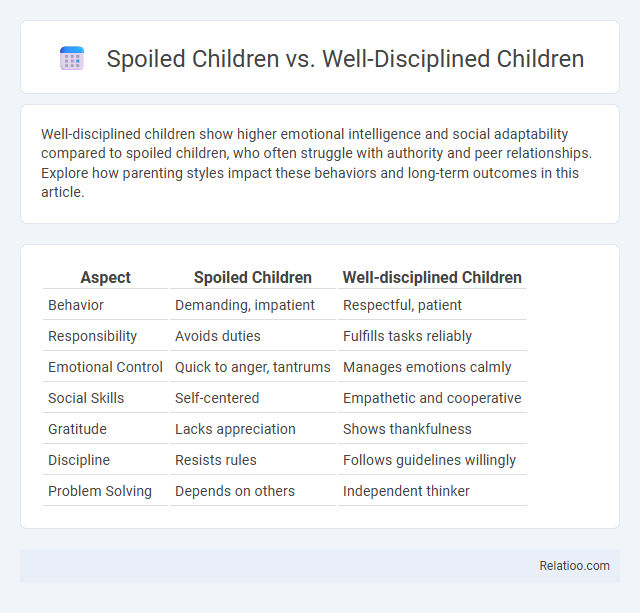Well-disciplined children show higher emotional intelligence and social adaptability compared to spoiled children, who often struggle with authority and peer relationships. Explore how parenting styles impact these behaviors and long-term outcomes in this article.
Table of Comparison
| Aspect | Spoiled Children | Well-disciplined Children |
|---|---|---|
| Behavior | Demanding, impatient | Respectful, patient |
| Responsibility | Avoids duties | Fulfills tasks reliably |
| Emotional Control | Quick to anger, tantrums | Manages emotions calmly |
| Social Skills | Self-centered | Empathetic and cooperative |
| Gratitude | Lacks appreciation | Shows thankfulness |
| Discipline | Resists rules | Follows guidelines willingly |
| Problem Solving | Depends on others | Independent thinker |
Understanding Spoiled Children: Key Characteristics
Spoiled children often exhibit entitlement, lack of patience, and difficulty accepting boundaries due to overindulgence and inconsistent discipline. Well-disciplined children demonstrate self-control, respect for rules, and resilience, shaped by clear expectations and balanced guidance. Overindulgence can hinder emotional growth and responsibility, differentiating spoiled behavior from healthy, well-regulated development.
Traits of Well-Disciplined Children
Well-disciplined children exhibit traits such as self-control, responsibility, and respect for boundaries, setting them apart from spoiled children who often display entitlement and lack of gratitude due to overindulgence. You can nurture well-disciplined behavior by consistently reinforcing rules and encouraging accountability. These children tend to develop strong problem-solving skills and emotional regulation, contributing to their overall success and social adaptability.
Causes of Spoiled Behavior in Kids
Spoiled behavior in kids often stems from overindulgence, where parents fulfill every desire without setting boundaries, leading to unrealistic expectations and lack of self-control. Well-disciplined children typically experience consistent rules and consequences, fostering responsibility and respect for limits. Your approach to balancing affection with firm guidelines plays a crucial role in preventing entitlement and encouraging healthy emotional development.
Parental Approaches to Discipline
Parental approaches to discipline significantly impact whether children develop as well-disciplined or spoiled; consistent boundaries and clear consequences foster self-control and respect, while overindulgence often leads to entitlement and poor behavioral regulation. Effective discipline strategies emphasize balanced guidance, combining warmth with firmness, enabling children to understand limits and internalize values. Conversely, permissive parenting, characterized by leniency and lack of enforcement, contributes to spoiled behavior by failing to teach responsibility and appropriate social conduct.
Emotional Impact: Spoiled vs. Disciplined Upbringing
Spoiled children often experience emotional instability due to unmet boundaries, leading to entitlement and frustration, while well-disciplined children develop emotional resilience and self-control through consistent guidance and clear expectations. Overindulgence can result in a lack of empathy and difficulty managing disappointment, affecting your child's long-term emotional health and social relationships. Fostering discipline without excessive leniency ensures your child cultivates emotional intelligence and balanced behavior essential for personal growth.
Social Skills: Comparing Spoiled and Disciplined Children
Spoiled children often struggle with social skills due to overindulgence, leading to difficulties in sharing, empathy, and cooperation. Well-disciplined children typically develop stronger social skills, demonstrating respect, patience, and effective communication. Your approach to discipline directly influences your child's ability to navigate social interactions and build meaningful relationships.
Long-Term Consequences of Spoiling
Spoiled children often develop entitlement and poor coping skills due to overindulgence, leading to difficulties in relationships and career stability in adulthood. Well-disciplined children tend to exhibit greater resilience, self-control, and social competence, which benefits their long-term personal and professional growth. Your guidance in setting boundaries and encouraging responsibility can prevent the adverse effects associated with spoiling and promote healthier development.
Benefits of Consistent Discipline
Consistent discipline fosters well-disciplined children by establishing clear boundaries and expectations, promoting emotional regulation and responsibility. Unlike spoiled children who often face consequences of overindulgence, disciplined children develop self-control and social competence essential for lifelong success. Regular, fair discipline enhances cognitive and behavioral outcomes, reducing the risk of entitlement and impulsivity.
Practical Strategies to Foster Self-Control
Practical strategies to foster self-control in children include setting consistent boundaries, offering age-appropriate responsibilities, and modeling positive behavior to differentiate well-disciplined children from spoiled ones. Avoiding overindulgence by limiting material rewards and emphasizing intrinsic motivation helps cultivate independence and emotional regulation. Encouraging delayed gratification through structured routines and clear expectations supports the development of self-discipline and resilience.
Parenting Tips for Raising Well-Disciplined Children
Effective parenting balances discipline and affection to nurture well-disciplined children who understand boundaries and respect rules. Avoid overindulgence, which often leads to spoiled behavior by setting consistent consequences and modeling self-control. Your approach should emphasize clear expectations, positive reinforcement, and emotional support to foster responsible and empathetic growth.

Infographic: Spoiled children vs Well-disciplined children
 relatioo.com
relatioo.com